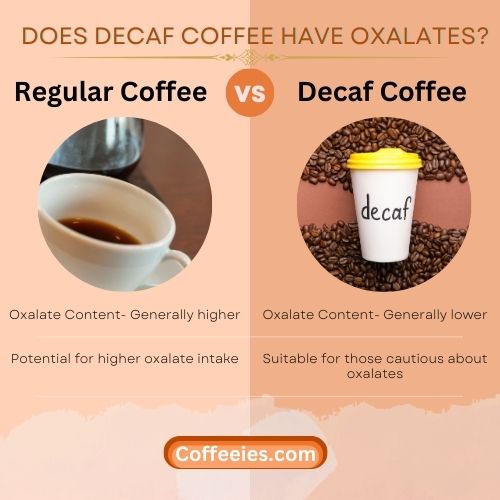Do you love the comforting taste of decaf coffee but worry about oxalates? Discover the truth: Does decaf coffee have oxalates?
Are they present in significant amounts, and can drinking decaf coffee increase your risk of kidney stones?
This article will delve into the research findings to provide the answers you need. Learn how to enjoy your favorite beverage without compromising your well-being.
Summary
- Decaf coffee generally contains less oxalates compared to regular coffee.
- The decaffeination process removes some compounds that contribute to oxalate formation.
- The exact oxalate content can vary depending on the brand and preparation method.
- Drinking decaf coffee in moderation is unlikely to significantly increase the risk of kidney stones.

Understanding Oxalates: What Are They and Why Are They a Concern
Let’s dive into the details if you’re wondering what oxalates are and why they’re a concern.
Oxalates are naturally occurring substances found in many foods, including fruits, vegetables, nuts, and grains. They can also be formed in the body as by-products of metabolism.
While oxalates are not harmful in moderate amounts, they can become a problem for some individuals.
The concern arises because oxalates have the potential to form crystals in the body, leading to the formation of kidney stones.
These stones can cause severe pain and discomfort when they pass through the urinary tract.
People who are prone to kidney stones or have certain medical conditions, such as hyperoxaluria or kidney disease, need to be mindful of their oxalate intake.
It is important to note that not everyone needs to avoid oxalates, as they are generally safe for most individuals in normal amounts.
The Oxalate Content in Regular Coffee Vs. Decaf Coffee: Is There a Difference
When it comes to the oxalate content in regular coffee vs. decaf coffee, is there a difference?
Many coffee lovers wonder if switching to decaf can help reduce their oxalate intake. The answer is yes, there is a difference.

| Aspect | Regular Coffee | Decaf Coffee |
|---|---|---|
| Oxalate Content | Generally higher | Generally lower |
| Decaffeination Impact | No decaffeination process | Yes, the notable difference |
| Variability | Varies among brands and preparation methods | Oxalate content varies by brand and preparation |
| Overall Difference | Yes, notable difference | Decaf generally contains fewer oxalates |
| Considerations | Potential for higher oxalate intake | Suitable for those cautious about oxalates |
Research Findings: Studies on Oxalate Levels in Decaf Coffee
You’ll be interested to know that several studies have examined the oxalate levels in decaf coffee. These research findings shed light on the amount of oxalates present in decaffeinated coffee.
Here are four key findings from these studies:
- Oxalate levels vary: Studies have found that the oxalate content in decaf coffee can vary significantly between different brands and brewing methods. This indicates that not all decaf coffees have the same oxalate levels.
- Lower than regular coffee: Overall, decaf coffee has been found to contain lower levels of oxalates compared to regular coffee. This is good news for individuals who are concerned about their oxalate intake.
- No significant health risks: The studies have not found any evidence to suggest that the oxalate levels in decaf coffee pose significant health risks, such as kidney stone formation. However, moderation is still advised.
- Individual tolerance matters: It’s important to note that the impact of oxalates can vary from person to person. Some individuals may be more sensitive to oxalates and should monitor their consumption accordingly.
These research findings provide valuable insights into the oxalate levels in decaf coffee, allowing consumers to make informed choices based on their individual needs and preferences.
Potential Health Effects: Does Decaf Coffee Increase the Risk of Kidney Stones
Decaf coffee does not significantly increase the risk of kidney stones.
While it is true that coffee, including decaf, contains oxalates, the amount present in decaf coffee is relatively low.
Drinking decaf coffee in moderation may even have some protective effects against kidney stone formation.

So, if you enjoy decaf coffee, you can continue to do so without worrying too much about its impact on your kidney health.
Tips for Managing Oxalate Intake: How to Enjoy Decaf Coffee Without Worrying About Oxalates
To reduce your oxalate intake while still enjoying decaf coffee, try these simple tips:
- Opt for Swiss Water Process decaf: The Swiss Water Process is a method of decaffeination that does not use chemicals, resulting in lower levels of oxalates compared to other decaffeination methods.
- Limit your consumption: While decaf coffee generally contains fewer oxalates than regular coffee, it’s still a good idea to moderate your intake. Stick to one or two cups per day to minimize your oxalate intake.
- Pair it with calcium-rich foods: Consuming calcium alongside oxalate-rich foods can help reduce the absorption of oxalates. Consider adding a splash of milk or enjoying a calcium-rich snack with your decaf coffee.
- Stay hydrated: Drinking plenty of water can help dilute oxalates in your urine, reducing the risk of kidney stone formation. Make sure to stay hydrated throughout the day, especially if you’re consuming decaf coffee.
Frequently Asked Questions
1. Does Decaf Coffee Have Oxalates?
Yes, decaf coffee does have oxalates, but generally in lower amounts compared to regular coffee. The decaffeination process reduces some compounds that contribute to oxalate formation.
2. How Does Decaf Coffee Compare to Regular Coffee in Oxalate Content?
Decaf coffee generally contains lower oxalates compared to regular coffee due to the decaffeination process. However, it’s important to note that oxalate levels can vary between brands and preparation methods.
3. Are There Any Benefits to Consuming Oxalates Found in Decaf Coffee?
There are potential benefits to consuming oxalates found in decaf coffee. They can help support kidney health and prevent the formation of kidney stones. However, moderation is key, as excessive oxalate intake can be harmful.
4. How Does the Processing Method of Decaf Coffee Affect Its Oxalate Content?
Decaf coffee does contain oxalates, but don’t worry, the processing method reduces the amount. So, even though it may have some, it’s not as much as regular coffee.
5. Can the Oxalate Content in Decaf Coffee Vary Between Different Brands or Coffee Shops?
Yes, the oxalate content in decaf coffee can vary between different brands or coffee shops. It’s important to check the packaging or ask the barista to know the specific oxalate levels.
Conclusion
Decaf coffee enthusiasts can rejoice! Contrary to popular belief, decaf coffee does not contain high levels of oxalates like regular coffee does.
Research findings suggest that the oxalate content in decaf coffee is significantly lower. So, if you’re worried about the risk of kidney stones, you can still enjoy your favorite cup of decaf without hesitation.
Raise your mugs and cheers to a kidney stone-free coffee experience!
Resources Used For Research
- Applicability of ICP-OES, UV-VIS, and FT-IR Methods for the Analysis of Coffee Products
- Prospective Study of Beverage Use and the Risk of Kidney Stones
- Decaffeinated coffee and its benefits on health
- Proteomic and computational analyses followed by functional validation of protective effects of trigonelline against calcium oxalate-induced renal cell deteriorations
- Characterization of AC1: a naturally decaffeinated coffee



